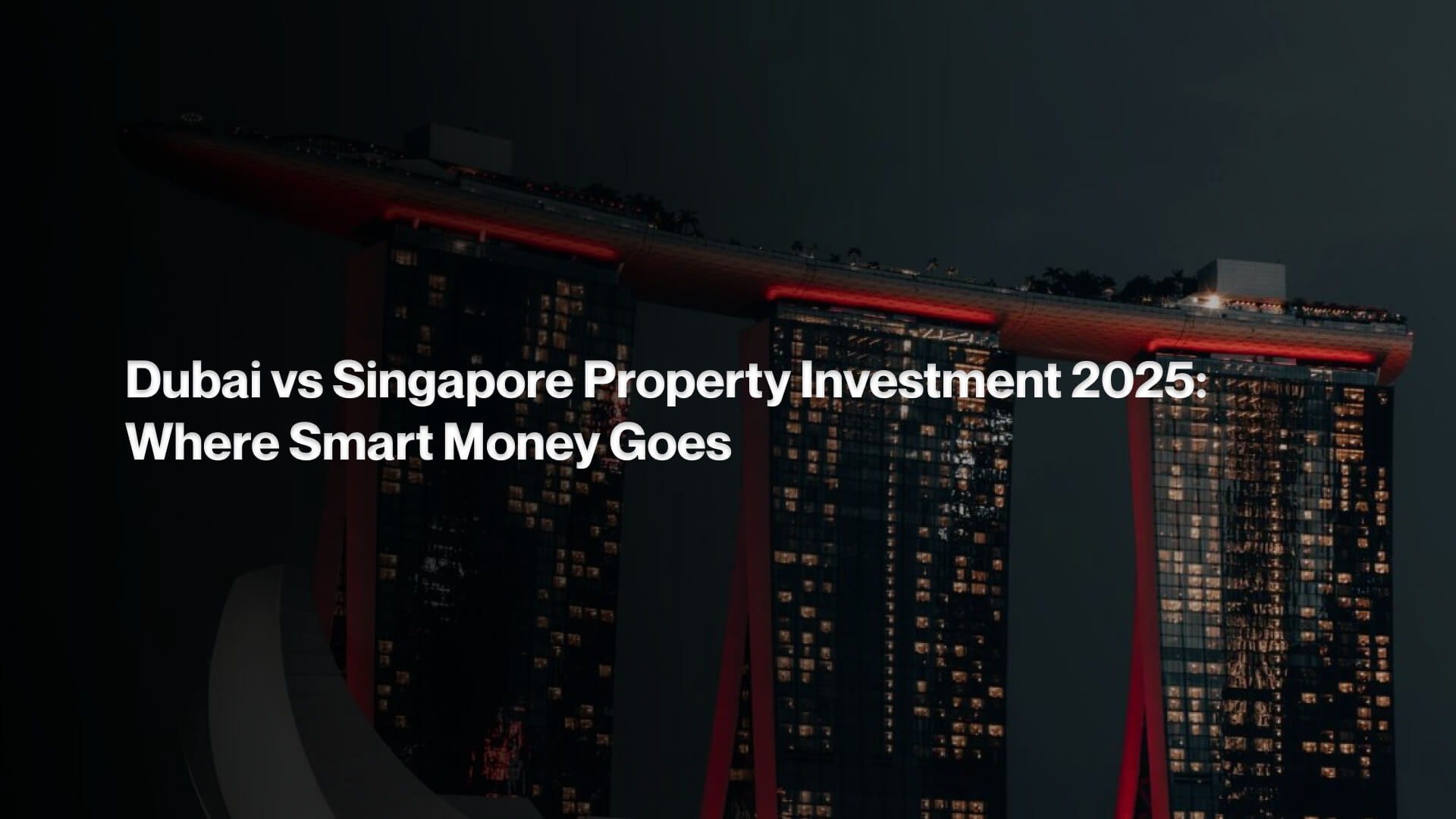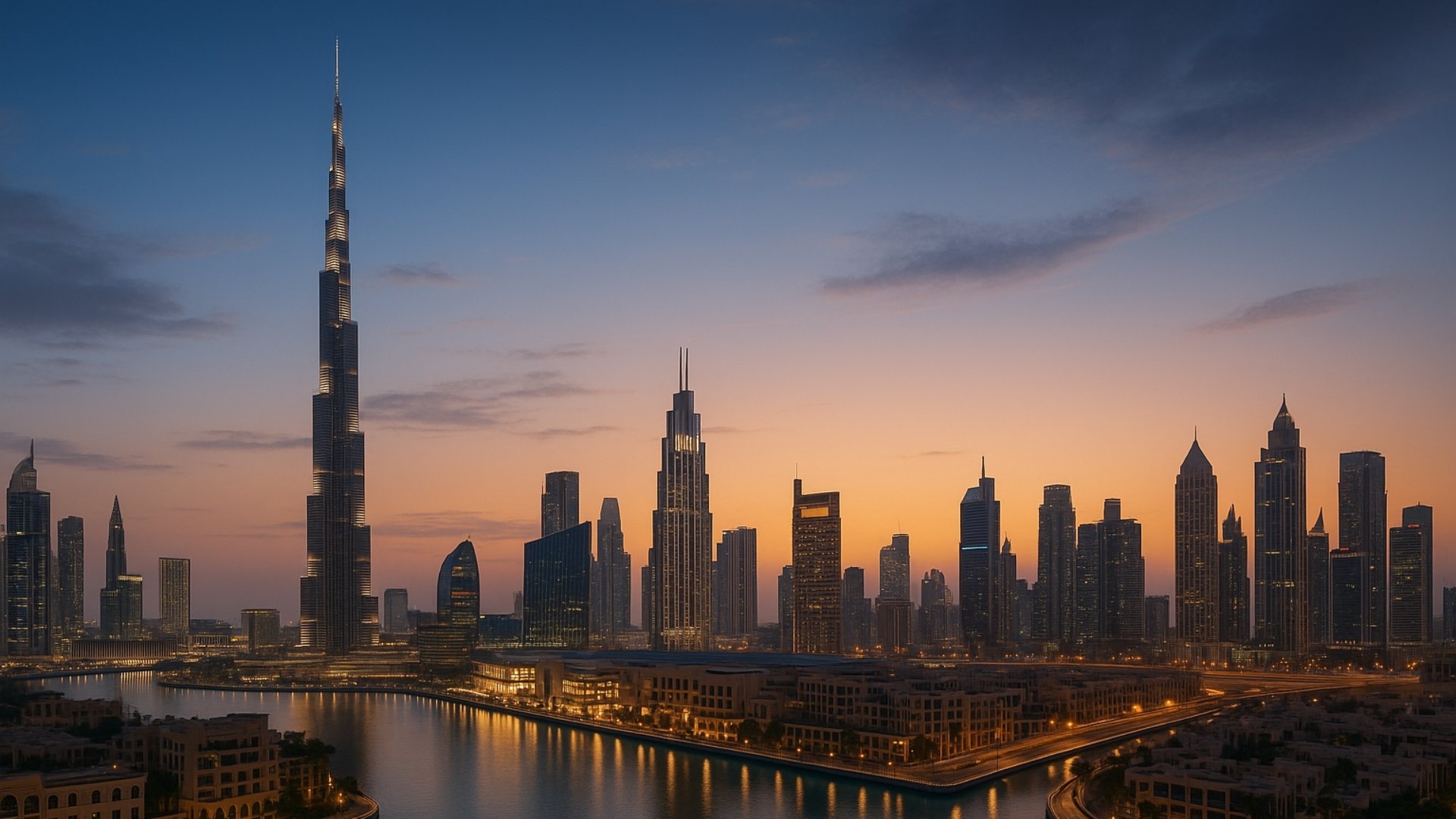
Dubai or Singapore for your next property investment? It's the million-dollar question every global investor asks. Both cities offer compelling opportunities, but they serve completely different investment strategies. Here's your complete 2025 guide to making the right choice.
The Tale of Two Markets: 2025 Snapshot
Dubai's property market roared into 2025 with record-breaking momentum. Transaction volumes hit AED 320 billion in 2024, with prime areas delivering 15-25% price appreciation. Meanwhile, Singapore's market grew a steady 8.5%, supported by its legendary stability and strict government oversight.
For live comparisons, investors can track Dubai transaction data via DXBinteract.
Rental Yields: The Income Game-Changer
Dubai Delivers Double-Digit Returns
Dubai's rental yields consistently outperform global averages. Here's what investors are seeing:
- Prime areas: 6-8% net yields
- Emerging communities: 8-10% yields
- Off-plan investments: Potential 10-12% upon completion
A AED 2 million apartment in Dubai Marina generates approximately AED 140,000-160,000 annually before expenses. Factor in Dubai's zero property tax, and your net returns remain intact.
Singapore: Modest but Stable
Singapore's yields reflect its premium pricing and limited supply:
- Prime districts: 2-3% gross yields
- Suburban areas: 3-4% maximum
- Landed properties: Often below 2%
That same SGD 2 million investment in Singapore might generate SGD 60,000-80,000 annually, but faces immediate tax erosion through property taxes and ABSD implications.
Tax Reality Check
Dubai's tax structure is beautifully simple:
- Property tax: 0%
- Capital gains tax: 0%
- Rental income tax: 0%
- Inheritance tax: 0%
Hidden costs to consider:
- Service charges: 8-25 AED per sqft annually
- DEWA utilities: Variable based on usage
- Property management: 5-8% of rental income
- Community fees: Vary by development
Singapore's Tax Maze
Foreign property investors face substantial tax obligations:
- ABSD for foreigners: 60% of purchase price
- Property tax: 10-20% on rental income
- Seller's Stamp Duty: Up to 12% if sold within first year
- Withholding tax: 15% on rental income for non-residents
Real example: A SGD 2 million condo purchase costs an additional SGD 1.2 million in ABSD alone, plus ongoing tax obligations that can consume 25-30% of rental income.

Market Access
Dubai: Open Door Policy
Dubai welcomes international investors with minimal restrictions:
- Freehold ownership available to all nationalities in designated areas
- No residency requirements for property purchase
- Golden Visa benefits for investments above AED 2 million
- Quick transactions: 2-4 weeks typical completion
- Financing available: Up to 75% for residents, 50-60% for non-residents
Singapore: Selective Entry
Singapore maintains strict foreign ownership controls:
- Foreigners restricted to condominiums and approved developments
- No landed property ownership for non-residents
- Limited financing: Maximum 75% LTV for qualifying buyers
- Extensive documentation requirements
- Longer transaction times: 6-12 weeks minimum
Risk Analysis: What Could Go Wrong?
Dubai Risk Factors
Dubai's growth comes with cyclical risks:
- Market volatility: 50-60% corrections in 2008-2009, 15-20% in 2014-2016
- Economic dependency: Tied to oil prices and regional geopolitics
- Developer risk: Off-plan purchases carry completion uncertainty
- Currency exposure: AED pegged to USD, regional tensions can impact sentiment
- Oversupply risk: New supply can impact specific areas
Singapore Risk Considerations
Even stable Singapore has investment risks:
- Government intervention: Cooling measures can change overnight
- High sunk costs: 60% ABSD creates massive entry barriers
- Limited upside: Tight supply controls prevent explosive growth
- Interest rate sensitivity: High leverage amplifies rate impact
- Liquidity constraints: ABSD makes exit expensive
Investment Strategy Match: Find Your Fit
The Income-Focused Investor
Choose Dubai if you want:
- 6-8% net rental yields
- Tax-free investment returns
- Residency visa benefits
- Monthly cash flow focus
- Can handle market cycles
Dubai hotspots for income:
For more data, see DXBinteract’s Dubai rental yield analysis.
The Capital Preservation Investor
Choose Singapore if you prioritize:
- Ultra-stable political environment
- Consistent 3-7% annual appreciation
- Currency diversification into SGD
- Wealth preservation over growth
- Regulated, transparent markets
Singapore prime areas:
- Orchard Road: Premium but stable
- Marina Bay: Iconic with steady demand
- Sentosa Cove: Luxury landed options
- River Valley: Central location premium
2025 Market Catalysts
Dubai Growth Drivers
Several mega-trends support Dubai's momentum:
- Expo City development: Creating new demand in Dubai South
- AI and fintech growth: Attracting young, high-earning professionals
- Continued visa liberalization: Making residency more accessible
- Infrastructure expansion: Palm Jebel Ali, Dubai Creek Harbour developments
- Regional hub status: Benefiting from Middle East economic growth
Singapore Stability Factors
Singapore's market supported by:
- Limited land supply: Maintaining natural price floors
- Financial center status: Consistent demand from wealth migration
- Government planning: Measured supply releases preventing crashes
- Regional stability: Safe haven during Asian market uncertainty
- Quality infrastructure: World-class amenities support premium pricing
Financing Your Investment
Dubai Mortgage Market
- Local banks: ADCB, Emirates NBD offer competitive rates
- Interest rates: 4-6% typically for property loans
- Down payment: 25% residents, 40-50% non-residents
- Foreign currency loans: Available from some international banks
- Pre-approval: Recommended for off-plan purchases
Singapore Financing Options
- Major banks: DBS, OCBC, UOB serve foreign investors
- Interest rates: 3.5-5% range for qualifying borrowers
- Strict criteria: Income verification, debt-to-income ratios
- Limited options: Fewer banks serve non-resident investors
- Higher deposits: Often require 40-50% down payment
The Practical Comparison
| Factor |
Dubai 2025 |
Singapore 2025 |
| Rental Yields |
6-10% |
2-4% |
| Property Taxes |
0% |
60% ABSD + ongoing taxes |
| Market Access |
Open to all |
Restricted for foreigners |
| Visa Benefits |
Golden Visa available |
Limited residency options |
| Price Growth |
15-25% in hot cycles |
5-10% steady growth |
| Transaction Speed |
2-4 weeks |
6-12 weeks |
| Market Maturity |
Emerging, cyclical |
Mature, regulated |
FAQs
Is Dubai or Singapore better for rental yields in 2025?
Dubai leads with 6–10% average yields, compared to Singapore’s 2–4%. See our Dubai rental insights.
Do foreigners pay tax on Dubai property?
No. Dubai has zero property, rental, and capital gains tax. Only service charges and utilities apply. Learn how this ties into Golden Visa property benefits.
Which is safer long-term: Dubai or Singapore property?
Singapore offers more stability and lower volatility. Dubai offers higher income and growth but comes with cyclical risks.
Where Smart Money is Moving
Based on 2024 transaction data and investor surveys:
Dubai attracts:
- Income-focused investors seeking 6-8% yields
- Tax-optimization strategies
- Investors wanting residency benefits
- Those comfortable with market cycles
- Portfolio diversification into Middle East growth
Singapore draws:
- Ultra-high-net-worth wealth preservation
- Conservative investors prioritizing stability
- Asian market exposure with political security
- Long-term generational wealth planning
- Currency diversification strategies
Making Your Decision
The "better" market depends on your investment DNA:
Choose Dubai for:
- Higher yields: 6-10% vs Singapore's 2-4%
- Tax efficiency: Zero property taxes vs Singapore's heavy burden
- Growth potential: Participate in regional economic expansion
- Residency benefits: Golden Visa programs
- Market accessibility: Open to all investors
Choose Singapore for:
- Political stability: Unmatched governance and transparency
- Currency strength: SGD historically outperforms most currencies
- Market maturity: Established legal framework and processes
- Wealth preservation: Conservative, regulated environment
- Regional hub: Asian financial center advantages
2025 Investment Recommendations
For new investors: Start with Dubai's proven communities (Marina, JBR, Business Bay) for immediate income and potential appreciation.
For portfolio diversification: Consider both markets - Singapore for stability, Dubai for growth and yield.
For income focus: Dubai delivers 2-3x the rental yields with zero tax burden.
For ultra-conservative strategies: Singapore's regulatory framework provides unmatched security despite higher costs.
The Bottom Line
Neither Dubai nor Singapore is universally "better" - they serve different investment objectives. Dubai excels at income generation and growth potential, while Singapore dominates in stability and wealth preservation.
The most successful global investors often choose both markets, using Singapore as their stability anchor and Dubai as their growth engine. This approach captures the benefits of both while managing concentration risk.
Your choice should align with your risk tolerance, investment timeline, tax situation, and financial goals. In property investment, the best market is the one that helps you sleep well at night while meeting your return expectations.
Ready to explore Dubai's highest-yielding communities? Connect with our investment specialists to discover opportunities delivering 6-8% net returns in 2025's hottest markets.
Ready to maximize your 2025 property returns? Our Dubai investment specialists help international investors identify the highest-yielding communities and secure prime properties. Contact us today for personalized investment strategies and exclusive off-market opportunities.